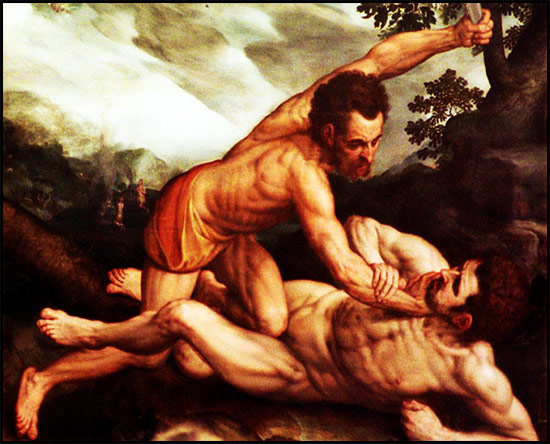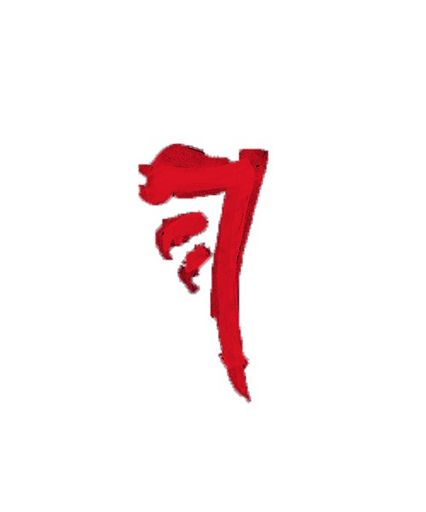Cain spoke to Abel his brother. And when they were in the field, Cain rose up against his brother Abel and killed him. Then the Lord said to Cain, “Where is Abel your brother?” He said, “I do not know; am I my brother’s keeper?” And the Lord said, “What have you done? The voice of your brother’s blood is crying to me from the ground. And now you are cursed from the ground, which has opened its mouth to receive your brother’s blood from your hand. When you work the ground, it shall no longer yield to you its strength. You shall be a fugitive and a wanderer on the earth.” Cain said to the Lord, “My punishment is greater than I can bear. Behold, you have driven me today away from the ground, and from your face I shall be hidden. I shall be a fugitive and a wanderer on the earth, and whoever finds me will kill me.” Then the Lord said to him, “Not so! If anyone kills Cain, vengeance shall be taken on him sevenfold.” And the Lord put a mark on Cain, lest any who found him should attack him. Then Cain went away from the presence of the Lord and settled in the land of Nod, east of Eden.
Genesis 4:8-16

The saga of Cain and Abel continues as we see the results of a heart corrupted and consumed by sin. We pick up as “Cain spoke to Abel his brother.” The word for “spoke” in the Hebrew is in what is called the sequential imperfect tense, which means it happens as part of a sequence of events (some time after the rejected sacrifice) but it was not a completed action (imperfect), meaning that Cain spent time speaking with Abel. Following this up with the next statement, “And when they were in the field, Cain rose up against his brother Abel and killed him.” This seems to indicate that Cain was planning this event for some time. Moses gives no clue as to how long Cain stewed in his jealousy of Abel, but we do know that he waited until they were isolated in a field, far from their parents.
When “sin is crouching at the door” (v. 7) there is a definite sense of danger, but it’s an unseen and unrecognized danger that will pounce without a moment’s notice. It lies in wait until the perfect moment to strike, when we let our guard down. And this is what is at play here with Cain as he has waited for the perfect moment, when Abel was disarmed to attack. The Scriptures give no clue as to what weapon Cain used. It could have been a rock, a knife, or simply his bare hands. Ultimately, Cain’s weapon of choice was a bitter, sinful heart.
And his sin did not go unseen or unpunished. Even so, God still gave even the hardened murderer Cain an opportunity to confess and repent of his murderous heart. “Where is Abel your brother?” Not only is this a rhetorical question, as God already knows what Cain has done, but it is a question that puts forth the reality of the relationship between Cain and Abel – a reminder that they were brothers, a bond in Ancient Near East society that was inseparable. And Cain’s response betrays this as he flippantly responds “I do not know; am I my brother’s keeper?”
The word for “keeper” here is synonymous with that of a watchman or a guard whose singular job is to protect the well-being of another. The truth is, we are indeed called to be one another’s keepers in the body of Christ. We are called to be on the lookout for one another and to warn each other of the dangers that lurk beyond the gates, when “sin is crouching at [our] door.” We are called to bear one another’s burdens. We are called to love one another. That is what it means to live in brotherhood and that is what the Israelites would have immediately understood as they were wandering through the dangers of the wilderness alone, with nobody to protect them except each other.
And God gives Cain another chance to confess and repent “What have you done? The voice of your brother’s blood is crying to me from the ground.” Cain’s stubborn refusal to accept responsibility for his sin and to confess and repent leads him to exile. So instead of knowing the peace and security that comes from the safety of God’s gracious hand, Cain is condemned to exile as a fugitive, always looking over his shoulder wondering when justice will befall him.
“I shall be a fugitive and a wanderer on the earth, and whoever finds me will kill me.” This is often taken as a confusing and someone contradictory verse until you understand the nature of Hebrew narrative that will often tell portions of a story outside of sequential order. Up to this point, all we have been told is that there are four people in the world – Adam, Eve, Cain, and Abel. No more, no less – until Cain murders Abel. But here we have indication that there are more people in the world. We could jump forward and see in Genesis 5:4 that Adam “had other sons and daughters.” So the only people who would be able to come after him were his own brothers and sisters, seeking justice for their murdered brother, a concept in honor/shame cultures of the day known as “honor killing.”
Yet here again, we see God extending grace to Cain, in spite of his murderous heart. Instead of striking Cain down himself, He continues to give Cain an opportunity to repent. “If anyone kills Cain, vengeance shall be taken on him sevenfold.” Murder and vengeance are not God’s plan for His creation. Repentance and reconciliation is His desire. So God puts a mark on Cain. A tattoo or a scar if you will.

Nobody knows what the Mark of Cain actually looks like as it is lost to history, but many have tried to speculate as to what it is. The popular television program Supernatural had a popular depiction of what their impression of the Mark of Cain looked like. Due to the popularity of the show, and its “cult following”, many have taken to get this version tattooed on their own bodies and some have even gone so far to have the mark branded into their skin as a scar. Symbolically, while it may be a pop culture phenomenon, those who take to this particular symbolism are either blatantly or unwittingly choosing to identify with the self-sufficiency and consequences of Cain’s sin of murder and rebellion against God.
However, the mark of Cain is contextually something that will mark Cain as protected by God, but harkening to something that the Hebrews were familiar with as it relates to such things – a branding as a slave. Cain is now reduced in his humanity to that of the meaning of his own name – a possession.
Possessed by his sin. Self-acquired and self-dependent as Cain “went away from the presence of the Lord and settled in the land of Nod, east of Eden.” Again, the theme of “east of Eden” arises as Cain is driven further from his roots in paradise. As sin continues to consume his heart, he lives in exile from the presence of God, building hell on earth.
When we abandon God in favor of living in self-dependence, we are no longer abiding in Him. We allow sin to wither our roots and as such, the work we do in this world will be fruitless (v12). Instead we become a slave to our own animalistic passions and live a life that is marked by sin and shame. In spite of it all, God will continue to offer grace in the hopes that we will repent and be reconciled to Him.